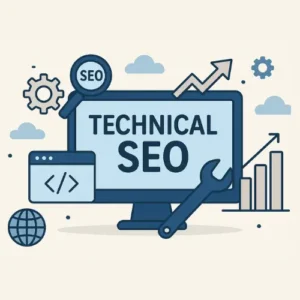Technicale SEO Agency by VectMax Digital Solution
Technical SEO focuses on optimizing a website’s backend elements to enhance search engine crawling, indexing, and understanding. Key areas include site speed, mobile-friendliness, secure connections (HTTPS), structured data, crawl error fixes, and XML sitemaps-ensuring better rankings and improved user experience.

The best Technical SEO Service Agency by VectMax Digital Solution
Partnering with a Technical SEO service agency means you can expect-
About for Technical SEO
Technical SEO refers to the process of optimizing a website’s infrastructure to help search engines crawl and index it more effectively. Unlike content or backlinks, it focuses on the backend elements of your website. The goal is to improve site performance, visibility, and user experience.
- Key Components of Technical SEO:
Website Speed Optimization
Mobile-Friendliness
Secure Connection (HTTPS)
Clean URL Structure
XML Sitemaps
Robots.txt File Optimization
Fixing Crawl Errors
Structured Data (Schema Markup)
Canonical Tags
Duplicate Content Management

Services Offered by Our Technical SEO Agency

Robots.Txt
A robots.txt file is a simple text file that tells web crawlers (robots or bots) which parts of a website they can access and which areas are restricted from crawling.

XML Sitemap
An XML sitemap is a file that lists all the important pages of a website in a structured XML format, helping search engines like Google, Bing, and others crawl and index the site.

404 Errors
A 404 error, commonly shown as “404 Not Found,” is an HTTP status code that means the server couldn’t locate the page or resource requested by the user.

Fix Broken Pages
To fix broken pages, start by identifying the broken links and determining the cause-such as a 404 error. Then, take action by either correcting the link, setting up a proper redirect, or removing it altogether.

Mobile Friendliness Test
A Mobile Friendliness Test checks how easily a visitor can use and navigate your website on a mobile device (like a smartphone or tablet). It’s an essential part of Technical SEO, as Google uses mobile-first indexing — meaning it primarily uses the mobile version of a site for indexing and ranking.

HTTPS
HTTPS (Hypertext Transfer Protocol Secure) is the encrypted and secure version of HTTP, used to ensure safe communication between web browsers and websites.
Why Technical SEO Matters?
Technical SEO is essential because it ensures your website is optimized for search engines to crawl, index, and rank your content effectively. Without it, even the best content may never reach your audience. Here’s why it matters:

Improves Crawlability – Helps search engines access and understand your website structure and content.
Boosts Site Speed – Faster-loading sites rank better and provide a smoother user experience.
Enhances Mobile-Friendliness – Mobile-optimized sites are prioritized by Google, especially with mobile-first indexing.
Fixes Indexing Issues – Prevents errors that could stop your site from appearing in search results.
Strengthens Website Security – HTTPS and other security measures improve trust and search visibility.
Optimizes Site Architecture – Clean URL structures, internal linking, and sitemaps guide both users and bots efficiently.
Reduces Bounce Rates – A technically sound site keeps users engaged with quick loading and easy navigation.
Testimonials For Local SEO






FAQs About Technical SEO Services by VectMax
What is Technical SEO?
Technical SEO refers to the process of optimizing a website’s technical elements—such as site structure, speed, and indexing—to help search engines crawl and understand the content more effectively.
Why is Technical SEO important?
Technical SEO ensures that your website meets the technical requirements of modern search engines, improving crawlability, indexability, and overall performance, which are essential for achieving higher search rankings.
What are the key components of Technical SEO?
Core elements include:
Website speed and performance
Mobile-friendliness
Secure connection (HTTPS)
Crawlability and indexing
Structured data (Schema)
XML sitemaps
Canonical tags
Fixing broken links and duplicate content
How does site speed affect SEO?
Search engines like Google prioritize fast-loading websites in their rankings because faster sites offer a better user experience. A slow website can lead to higher bounce rates and lower search visibility.
What is an XML sitemap, and why is it important?
An XML sitemap is a file that lists all the important pages of a website, helping search engines find and index your content more efficiently. It acts as a roadmap for crawlers.
What is a robots.txt file?
The robots.txt file tells search engine bots which pages or sections of your website they are allowed or disallowed to crawl. It’s a key tool in controlling what gets indexed.
How does mobile-friendliness impact SEO?
With Google’s mobile-first indexing, a mobile-friendly site is crucial. If your site isn’t optimized for mobile devices, it could negatively affect your rankings on both mobile and desktop search results.
How often should I audit my website for technical SEO issues?
It’s best to perform a technical SEO audit every 3–6 months, or after any major site changes, to ensure everything is functioning correctly and up to search engine standards.